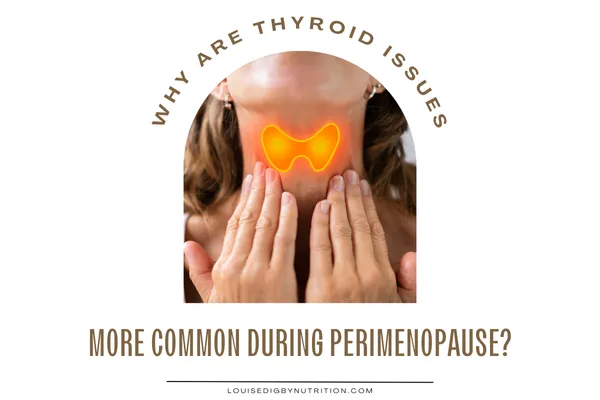Hey...

Why Thyroid Problems Are More Likely to Develop During Perimenopause
Have you ever wondered why so many women in their 40s and 50s start experiencing thyroid-related symptoms? We see this combination with our clients very regularly. Fatigue, weight gain, hair thinning, and trouble sleeping can creep in, often dismissed as “just getting older.” But there’s more to the story, and understanding the link between perimenopause and thyroid health can help you take control of your body and your wellbeing.
The Connection Between Perimenopause and Thyroid Health
Perimenopause is the transitional phase leading up to menopause when hormonal changes begin to accelerate. These changes are not limited to your reproductive hormones like oestrogen and progesterone; they also ripple out to your thyroid, a small but mighty gland that regulates metabolism, energy, digestion, and mood.
Here are the key ways perimenopause affects thyroid health:
1. Hormonal Fluctuations and the Thyroid
During perimenopause, oestrogen and progesterone levels fluctuate wildly. These hormones interact closely with thyroid function. For instance, high levels of oestrogen can increase thyroid-binding globulin (TBG), a protein that binds to thyroid hormones in your bloodstream, making them less available for use by your cells. At the same time, declining progesterone can lead to an imbalance, amplifying inflammation and stress on the thyroid.
2. Increased Stress and Cortisol Levels
Perimenopause is often accompanied by heightened stress, whether from hormonal changes, life circumstances, or both. Elevated cortisol levels (your stress hormone) can interfere with the conversion of T4 (the inactive thyroid hormone) to T3 (the active form your body uses for energy and metabolism). Chronic stress can also dampen thyroid function, contributing to fatigue, weight gain, and brain fog.
3. Autoimmune Risk Peaks
Women are already more prone to autoimmune conditions than men, and this risk increases during hormonal transitions. Conditions like Hashimoto’s thyroiditis, an autoimmune disorder where the immune system attacks the thyroid, often emerge or worsen during perimenopause. These conditions are frequently underdiagnosed, leaving women struggling with symptoms without answers.
4. Nutrient Deficiencies
As hormone levels shift, your body’s demand for key nutrients changes too. Nutrients like iodine, selenium, zinc, and iron are critical for thyroid health, but they’re often depleted during perimenopause due to changes in digestion, absorption, or dietary habits. Without these nutrients, your thyroid struggles to function properly, leaving you feeling drained and stuck.
It’s Not “Just You”
If you’ve felt dismissed or told that your symptoms are just part of “getting older,” it’s important to know that these changes are real, measurable, and impactful. Your thyroid is a sensitive gland, finely tuned to your body’s overall balance. During perimenopause, the interplay of hormonal shifts, stress, and nutrient needs can tip this balance, leading to symptoms that are often misattributed to other causes.
You’re not imagining your fatigue, stubborn weight gain, or brain fog. These are signs that your thyroid might need attention.
The Path Forward
The good news? You don’t have to settle for feeling less than your best. By addressing the root causes of thyroid dysfunction and supporting your body through this hormonal transition, it’s possible to regain your energy, improve your sleep, and finally see progress with digestion and weight loss.
A holistic approach focuses on:
Balancing Hormones: Supporting oestrogen and progesterone balance to reduce stress on your thyroid.
Managing Stress: Implementing strategies to lower cortisol levels and support adrenal health.
Targeted Nutrition: Ensuring your thyroid gets the nutrients it needs, like selenium, zinc, and iodine (though it is best not to take iodine without supervision for a health or nutrition professional).
Personalised Support: Identifying any autoimmune triggers or underlying imbalances unique to you.
With the right strategy, women in their 40s and beyond can feel vibrant, energised, and in control of their health. Over the next six months, it is possible to see significant improvements in energy, sleep quality, digestion, and even weight loss—but it starts with addressing the root causes.
You’re Not Alone
Many women feel stuck during this stage of life, but with the right guidance, you can navigate these changes with confidence. If you’re ready to take the next step and explore a personalised, holistic approach, know that there are solutions designed just for you. It’s never too late to prioritise your health and feel like yourself again.
If you're ready to explore a personalised solution focused on address the root causes of your symptoms and stubborn weight, explore The Nourish Method here.

Why Thyroid Problems Are More Likely to Develop During Perimenopause
Have you ever wondered why so many women in their 40s and 50s start experiencing thyroid-related symptoms? We see this combination with our clients very regularly. Fatigue, weight gain, hair thinning, and trouble sleeping can creep in, often dismissed as “just getting older.” But there’s more to the story, and understanding the link between perimenopause and thyroid health can help you take control of your body and your wellbeing.
The Connection Between Perimenopause and Thyroid Health
Perimenopause is the transitional phase leading up to menopause when hormonal changes begin to accelerate. These changes are not limited to your reproductive hormones like oestrogen and progesterone; they also ripple out to your thyroid, a small but mighty gland that regulates metabolism, energy, digestion, and mood.
Here are the key ways perimenopause affects thyroid health:
1. Hormonal Fluctuations and the Thyroid
During perimenopause, oestrogen and progesterone levels fluctuate wildly. These hormones interact closely with thyroid function. For instance, high levels of oestrogen can increase thyroid-binding globulin (TBG), a protein that binds to thyroid hormones in your bloodstream, making them less available for use by your cells. At the same time, declining progesterone can lead to an imbalance, amplifying inflammation and stress on the thyroid.
2. Increased Stress and Cortisol Levels
Perimenopause is often accompanied by heightened stress, whether from hormonal changes, life circumstances, or both. Elevated cortisol levels (your stress hormone) can interfere with the conversion of T4 (the inactive thyroid hormone) to T3 (the active form your body uses for energy and metabolism). Chronic stress can also dampen thyroid function, contributing to fatigue, weight gain, and brain fog.
3. Autoimmune Risk Peaks
Women are already more prone to autoimmune conditions than men, and this risk increases during hormonal transitions. Conditions like Hashimoto’s thyroiditis, an autoimmune disorder where the immune system attacks the thyroid, often emerge or worsen during perimenopause. These conditions are frequently underdiagnosed, leaving women struggling with symptoms without answers.
4. Nutrient Deficiencies
As hormone levels shift, your body’s demand for key nutrients changes too. Nutrients like iodine, selenium, zinc, and iron are critical for thyroid health, but they’re often depleted during perimenopause due to changes in digestion, absorption, or dietary habits. Without these nutrients, your thyroid struggles to function properly, leaving you feeling drained and stuck.
It’s Not “Just You”
If you’ve felt dismissed or told that your symptoms are just part of “getting older,” it’s important to know that these changes are real, measurable, and impactful. Your thyroid is a sensitive gland, finely tuned to your body’s overall balance. During perimenopause, the interplay of hormonal shifts, stress, and nutrient needs can tip this balance, leading to symptoms that are often misattributed to other causes.
You’re not imagining your fatigue, stubborn weight gain, or brain fog. These are signs that your thyroid might need attention.
The Path Forward
The good news? You don’t have to settle for feeling less than your best. By addressing the root causes of thyroid dysfunction and supporting your body through this hormonal transition, it’s possible to regain your energy, improve your sleep, and finally see progress with digestion and weight loss.
A holistic approach focuses on:
Balancing Hormones: Supporting oestrogen and progesterone balance to reduce stress on your thyroid.
Managing Stress: Implementing strategies to lower cortisol levels and support adrenal health.
Targeted Nutrition: Ensuring your thyroid gets the nutrients it needs, like selenium, zinc, and iodine (though it is best not to take iodine without supervision for a health or nutrition professional).
Personalised Support: Identifying any autoimmune triggers or underlying imbalances unique to you.
With the right strategy, women in their 40s and beyond can feel vibrant, energised, and in control of their health. Over the next six months, it is possible to see significant improvements in energy, sleep quality, digestion, and even weight loss—but it starts with addressing the root causes.
You’re Not Alone
Many women feel stuck during this stage of life, but with the right guidance, you can navigate these changes with confidence. If you’re ready to take the next step and explore a personalised, holistic approach, know that there are solutions designed just for you. It’s never too late to prioritise your health and feel like yourself again.
If you're ready to explore a personalised solution focused on address the root causes of your symptoms and stubborn weight, explore The Nourish Method here.
Nourish Your Body, Lose Weight For Good
Like many women, you may be struggling to shift the weight despite dieting and taking care to consume fewer calories than they burn. This is a common experience for women over 35, and it's rooted in how your hormones and metabolism change over time.
Restricting calories too much actually further damages the metabolism and hormones, and an entirely different approach is required to heal your metabolism and lose weight without experiencing rebound weight gain.
Like many women, you may be struggling to shift the weight despite dieting and taking care to consume fewer calories than they consume. This is a common experience for women over 35, and it's linked to how your hormones and metabolism change over time.
Restricting calories too low actually further damages the metabolism and hormones, and an entirely different approach is required to heal your metabolism and lose weight without experiencing rebound weight gain.
© Copyright 2012-2025. All Rights Reserved by Louise Digby Nutrition Ltd | Privacy Policy
Contact Us: support@louisedigbynutrition.com




